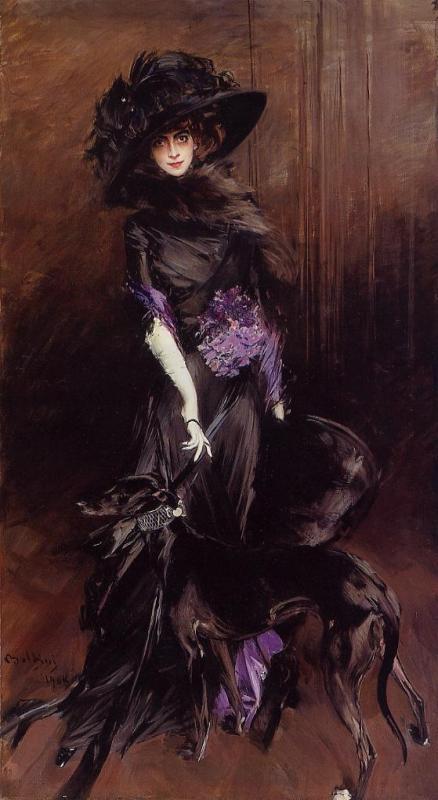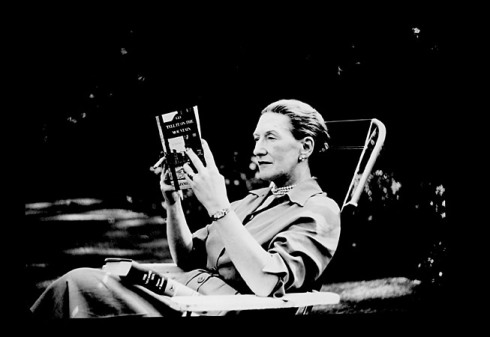We turned at a dozen paces, for love is a duel
Been reading Door Wide Open and loving it hard. It’s a collection of letters between a restless Jack Kerouac at 35, with On The Road written years earlier but not yet published, and his 21 year old girlfriend Joyce Glassman, working on her first novel and exploring the beat scene in New York. Joyce (now Johnston) edited this book recently, and in her frequent interjections gives context to everything, explains the untruths and unsayable things the letters are skimming around. While it’s amazing to see Kerouac’s charisma shine through his letters, it’s definitely not all about him – I can’t get over how smart and brave and clear-v0iced Glassman was at 21, choosing to walk away from respectable society in the 1950s, pre-feminism , pre-free love. Here’s one of my favourite excerpts, from a letter Joyce wrote to Jack:
July 26 1957
… But then I remember walking with you at night through the Brooklyn docks and seeing the white steam rising from the ships against the black sky and how beautiful it was and I’d never seen it before – imagine! – but if I’d walked through it with anyone else, I wouldn’t have seen it either, because I wouldn’t have felt safe in what my mother would categorically call “a bad neighborhood,” I would have been thinking “Where’s the subway?” and missed everything. But with you – I felt as though nothing could touch me, and if anything happened, the Hell with it. You don’t know what narrow lives girls have, how few real adventures there are for them; misadventures, yes, like abortions and little men following them in subways, but seldom anything like seeing ships at night. So that’s why we’ve all taken off like this, and that’s also part of why I love you.”
They Say It Fades, If You Let It
I’ve come home to focus on quieter and more thoughtful things. Life essentials. Family and food,reading and learning, sleeping and health. To try and be more good. Balanced, patient, peaceful.
And deep down, it seems that maybe I’m not ready for that, because the first book I chose at the libary was Casanova: or the Art of Happiness. And of course I have fallen In Love with the scoundrel, and his joy in the moment and delight in turning unknown situations to his advantage through sheer force of charm. Somehow he, and his lovers, seem to just choose to take the pleasure and refuse to feel any pain at its end or loss.
I don’t know that I could ever be like that, but I would like more adventures. This is having a somewhat shambolic effect on all my previous good intentions.
After years galavanting across Europe freely,bouncing between riches and poverty, Casanova ended his years as a librarian in a Bohemian castle, warding off his boredom by writing a 12 volume history of his exploits. Below is a quote on this time from the book I’m reading, that made me cry a little:
Casanova does not draw up a catalogue of his beauties. He does not love all women, he loves one woman at a time, each for her uniqueness. He does not count or enumerate them on a cold list of conquest, or a sinister hunter’s log. He remembers them with emotion. Their charms seem to be affecting him again. From a distance, through the passage of time, and sometimes beyond death, the memories of the women he loved remain intact within him. We sense the artist ready to surrender to his model. What would the old man not give to see one of them escape alive ffrom his pages and join him in his sad exile!
After having desired and loved them, Casanova puts his lovers tenderly to rest on the page. It is his way of being faithful to them forever. The inconstant lover gives his lovers immortality.
According to the madness that has seduced you
Favourite line so far in the latest AnOther, from a reference to Peggy Guggenheim’s museum in Venice:
“The palazzo had once been home to another rare bird, the Marchesa Casati, who was a tourist attraction in Venice in the 1910s, walking her pet cheetahs on jewel-encrusted leads nightly throughout the city, nude but for a leopard skin.”
Unbearably intriguing.
You can read more at the Casati Archives, some gems:
“Accompanied by her pet boa constrictor, she checked into the Ritz Hotel in Paris where it escaped….”
“Bizarre wax mannequins sat as guests at her dining table, some of them even rumoured to contain the ashes of past lovers…”
“Nude servants gilded in gold leaf attended her…”
Both the paintings I’ve included here are terribly lovely, but maybe not entirely representative. Casati was a muse and patron of many avant garde artists, a bit of searching reveals some very dramatic and strange portraits and photographs.
Mysteries Aren’t For Me
 ‘Protect Me’ Ring by Zoe & Morgan
‘Protect Me’ Ring by Zoe & Morgan
I’ve started reading Agatha Christie! I love that I can zip through them quickly, it’s been so long since I read a book that was mostly about plot. However, it’s not all smooth. The first one I took home was The Murder of Roger Ackroyd – which I randomly picked off the library shelf, but it turns out of all her 80 detective novels, that’s ‘the masterpiece’ with the big shock twist. So it was great, but it would have been much better if I’d already read a few mysteries – watching the rules get smashed unexpectedly is much more fun if you know what the rules are.
And then last night I picked up Murder Under The Sun and just could not put it down. Not just because it was good, but because I had that sudden awful knowledge that I would feel massively uneasy until I knew whodunnit. Like, unable to sleep, uneasy. So not fun. So while I’d meant to read a couple of chapters in bed, I had to force myself to push right through the final half of the book. It was a late night. I’m not sure I have the steeliness of spirit for murder mysteries… and this is patent proof that I will never be reading for ghost tales.
Oh, and Agatha Christie herself is so interesting:
“During the Second World War, Christie wrote two novels, Curtain and Sleeping Murder, intended as the last cases of these two great detectives, Hercule Poirot and Jane Marple, respectively. Both books were sealed in a bank vault for over thirty years, and were released for publication by Christie only at the end of her life, when she realized that she could not write any more novels. These publications came on the heels of the success of the film version of Murder on the Orient Express in 1974.” From Wikipedia
Whenever I end up reading accidentally about Prince Charles I get so sad for some reason. (Somehow I ended up at the Wikipedia page for Lord Mountbatten’s mentorship of said Prince.)
In the happiest sense, a haunting
Currently reading: Love’s Civil War, which is the story of Elizabeth Bowen (English writer) & Charles Ritchie (Canadian diplomat) being in love for 30 years, after meeting in middle age, being separated by continents, married to other people. It’s largely told through Elizabeth’s rambly, intimate letters to Charles, with the odd diary entry of his dashed in there for contrast. Am feeling much the same about it as Independent reviewer John Walsh:
“The flow of brittle charm seldom subsides, but there’s an urgency about her protestations of love. You get the impression she kept the affair going by an act of determined will. This feeling is reinforced by the one-sidedness of the correspondence. Ritchie destroyed his letters to Elizabeth after her death. We have no record of his intimacies, insights, promises or undertakings; none of the thousands of ways he beguiled her over 30 years.”
To read a one-sided correspondence is so frustrating. I just about had a fit when I started the book and realised I would never see Elizabeth’s questions’ answered, declarations of love returned. Nonetheless, I’ve been won over and will even read her descriptions of gardens and scenery, which as a rule I can’t help skipping, ever since my LM Montgomery days.
Here’s Elizabeth to Charles, on 12 April 1955:
“Easter morning was pure and dazzling. I longed to kiss you on the forehead and say, ‘Christ is risen.’ They have banked the Spanish Steps with azaleas, mostly white…”*
This passage is what grabbed me in the bookstore. It’s so confusing to me, to talk with one’s married lover so blithely about God and church and Easter. Did she believe the strength of her feelings made their love blessed whatever the circumstances? Or was church more of a tradition and idea, no authority? I’m not really judging, I just can’t help but wonder – did she really feel so joyous, so welcome, there, thinking of him? Elsewhere she speaks so girlishly of her love for the old hymns.
* Last portion only included because I didn’t want three quote marks in a row and didn’t know how else to deal, oh dear.
Maybe I’ve been here before
Favourite tidbit in Elizabeth, The Queen Mother, to date:
Raymond de Trafford… fell for Alice de Janzé, described as ‘a young American man eater who played with lion cubs and was said to look like a “wicked Madonna” … in 1927 de Trafford went to Paris to inform Alice that, as a strict Catholic, he could not marry her. She came to his railway compartment at the Gare du Nord, shot first him and then herself. Neither died. They married in 1932.
I knew I’d love this book! [Actually, there’s no happy ending to that story – she was a crazy b!tch! But interesting.]
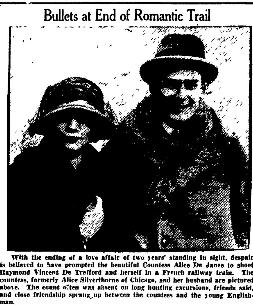
Every, Every Time

Oh dear, oh my, oh me (http://donttouchmymoleskine.wordpress.com)
Nancy Mitford had a terribly raw deal with men, which is unfair and depressing because she was so clever and funny and chic, and her book The Pursuit of Love is my absolute favourite. While it’s usually a sidenote in bios/memoirs, I’ve always been fascinated by the period in her life when she was wildly in love with the frivolous Hamish St-Claire Erskine. From when she was about 25-30, they were very close, sometimes engaged, but it never came to anything.
Her letters to friends at this time are such a reminder of how love messes everything up is a pretty universal experience:
1929: “Hamish has been an angel lately, not drinking a thing. I really think that bar all the good old jokes which no one enjoys more than I do, that he has literally the nicest nature of anyone I know. He gets nicer every day too.”
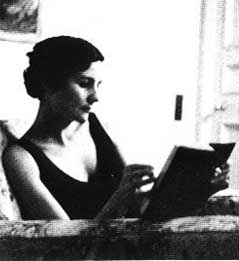
Nancy
1930:“…if I had been married to Hamish for five painful years and borne him six male children I couldn’t know him better and the curious thing is that I’m quite certain that I shall never never be so fond of anyone again.”
1931: “I’m in the state in which I can’t be alone but the moment I’m with other people I want to get away from them… How can I possibly write a funny book in the next six months when my publisher says I must do. How can I when I’ve got practically a pain from being miserable and cry in buses quite continually?”
* * * * * *
After years and years of those ups and downs, Nancy suddenly married one Peter Rodd (“Prod”) on the rebound. He turned out to be drunk, wasteful, philandering, and worst of all boring. Then she moved to France and fell in love with Gaston Palewski – who I always think of as a Magnificent Bastard by nature – who enjoyed her company well enough but could never really love her the way she loved him, and eventually married someone else. That was as good as it ever got.
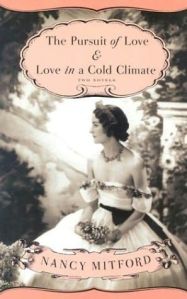
The Pursuit Of Love
There’s an addendum, though, to the Hamish story. Some days it makes me grin in female solidarity, some days it makes me sad (because everyone, everything ends) and some days it gives me gritty hope for that same reason.
1972: “I had Hamish [to stay] for two nights. He said, “we would have been married now for thirty years.” Help!! He is very dull and might have been more difficult to get rid of than poor Prod was.”
I’ll Always Look Back, As I Walk Away
I feel a new obsession coming on with Elizabeth Bowes-Lyon, the Queen Mother. And can you blame me? Just read the Legacies section of her Wikipedia Page , which is really more a selection of unexpectedly funny stories, for example: On hearing that Edwina Mountbatten was buried at sea, she said: “Dear Edwina, she always liked to make a splash.” I would also love to see the video of her rising from the royal carriage to beat an overly enthusiastic admirer about the head with her umbrella, but they didn’t have YouTube in 1947.
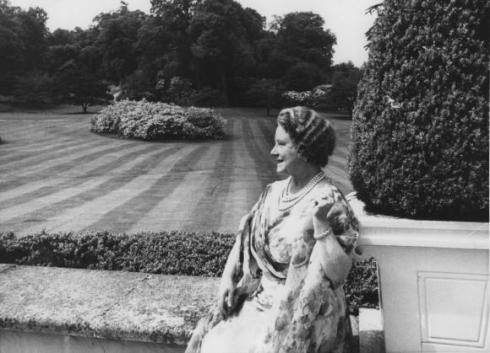
On her 70th birthday, photo by Cecil Beaton
The current Poet Laureate, Andrew Motion (what an appropriately Romantic name!) has said publically how difficult it is to write about modern royals. I can imagine it’s not a pleasant obligation, the British Royal fam are sort of concurrently uber-familiar (the faces you can count on seeing at the supermarket aisle or doctor’s waiting room) and so distant from the average life that it is almost impossible to address them seriously without feeling a little bit ridiculous. But the other day I stumbled upon his two poems about the Queen Mother – written for her 100th birthday and funeral – and curiously found myself in tears. Excerpt below, poems in entirety here.
1997
No changes, on the face of it: the balconies,
the open smile and wave, the garden parties,
and the hats, the hats, the hats, all pictures
in our albums or our heads along with these:
the photos no-one took of you…
the grandmother-confessor-friend, the mourner
at divorces and the rest, the worldly watcher
of the world who shows the world no changes
on the face of it: the balconies, the open wave
and smile, the hats, the hats, the hats.
Hugo Vickers has written a biography of her (Elizabeth, The Queen Mother) – he also edited the collection of Cecil Beaton diaries I’m reading at the moment, so it’s sort of nice to have a familiar voice to guide me into another person’s life. I am expecting it to be shriekingly funny…
-

- The Queen Mother, on her 100th birthday
“Then we had this rather lugubrious man in a suit, and he read a poem…I think it was called The Desert. And first the girls got the giggles and then I did and then even the King”
The QM, on T.S. Eliot’s visit to Winsor Castle to recite The Wasteland in 1947
Here Is Gone
There’s some amazing images of the grand decaying relics of Detroit here, at Sociological Images. They also have, like, intelligent graphs and commentary, but I’m feeling simultaneously frivilous and morbid so let’s just do some of the photos here:

Gothic Theatre (built 1928, closed in 1970s)
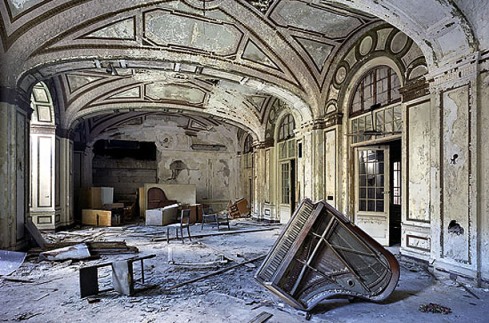
Lee Plaza, luxury hotel closed in 1990s
Photos by: Yves Marchand and Romain Meffre
It looks terribly romantic to me, the perfect spot for a clandestine picnic on a rainy day, but I suppose there would be rats.
I Have Been Tricked By Flying Too Close

Mausoleum of Rumi, Turkey
I’ve had this poem saved on my computer for years, I can’t remember where I found it and I always vaguely thought it was by some semi-obscure contemporary poet. My bad! It’s actually by Rumi, a renowned Persian poet and philosopher from the 13th century.
“I Have Been Tricked By Flying Too Close” – Rumi
I have been tricked by flying too close
to what I thought I loved.Now the candleflame is out, the wine spilled,
and the lovers have withdrawn
somewhere beyond my squinting.The amount I thought I’d won, I’ve lost.
My prayers become bitter and all about blindness.How wonderful it was to be for a while
with those who surrender.Others only turn their faces one way,
then another, like a pigeon in flight.I have known pigeons who fly in a nowhere,
and birds that eat grainlessness,and tailors who sew beautiful clothes
by tearing them to pieces.
I’ve just done some light research on him tonight, and found many more beautiful poems and quotes as well. He reminds me of Leonard Cohen (I know that seems gratuitous, given L.Co is the only poet I’ve read much of in years, but I will stand by it & take what flack may come!). If you feel like browsing some of his writings, his WikiQuote page is a good place to start…
Come, come, whoever you are.
Wanderer, worshipper, lover of leaving – it doesn’t matter,
Ours is not a caravan of despair.
Come, even if you have broken your vow a hundred times,
Come, come again, come.



